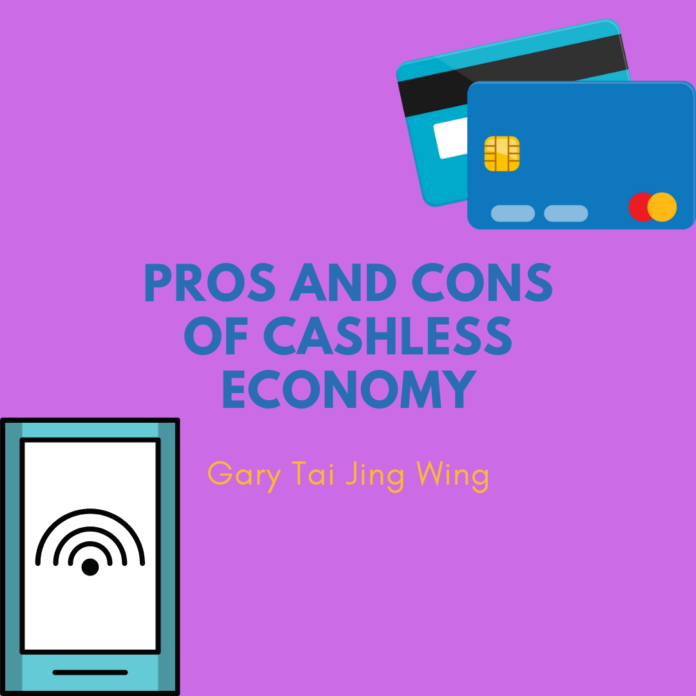The Pros and Cons of the Cashless Economy In recent years, tremendous digitization and technological advancement have affected almost every part of our lives and in every industry. During this evolution, the paper currency that once dictated the world’s economy had gradually been abolished.
As cash is facing undeniable decline, emerging technology trends and the digital revolution have given rise to the concept of digital currency in the economic system. This concept was soon known as a cashless economy.
According to UKEssays (2015), a cashless economy refers to a system where financial transactions are made by electronic means rather than using physical currency to pay for goods and services.
Many countries began to embark upon the transition to a cashless economy due to the revolutionary step of demonetization taken by their government.
The main idea is to reduce the countries’ dependency. In this essay, I shall discuss the pros and cons of a cashless economy, along with its rational factors and in-depth explanations.
Money laundering has been perceived as a highly intelligent yet complicated crime that conceals the illicit origins of money obtained illegally. This process requires deliberate acts of manipulation which were carried out to fulfil a personal advantage. (Abdul-Rahman, 2014). Due to the degree of complexity of the money laundry operation, governments or agencies can’t produce a precise and accurate estimate of money being laundered. However, curbing the menace of black money or money laundering became possible due to the cashless economy.
This is because a cashless economy prioritises transparency, ease, and convenience in monetary transactions. (Trending WeBlog, 2019) Since all payments made online are audited, a cashless economy has increased the possibility of insights on every transaction. This transparency in money flow reduces the scope of a parallel economy. (Reading Junction, 2020) As a result, the cashless economy was able to bring back hordes of stashed black money lying unused into the banking system.
Needless to say, the central bank is considered the heart of a nation’s economy. They are in charge of producing physical money into the economy to regulate the amount of money circulation. (Bajpai, 2020) In the United States, the Department of the Treasury’s Bureau of Engraving and Printing is in charge of producing the US currency.
As stated in Appendix 1, the Department requires at least 7.7 cents to print a US Dollar note. (Board of Governors of the Federal Reserve System, 2020) In total, the 2020 currency operating budget is roughly 877.2 million dollars, which could have been used for infrastructure development if the country had transitioned to a cashless economy.
With that being said, a cashless economy could save the substantial cost of printing and circulating notes.
(Trending WeBlog, 2019) Therefore, if a currency is used sparingly in a country, the cost of printing and maintaining it will be reduced. Even though a cashless economy can be beneficial for a country’s welfare, privacy issues however accompany the method of payment.
Unlike the cash or bartering system, cashless payments require secondary recording systems to make cashless mediums of exchange. These ubiquitous records imperil privacy, which has been defined by Warren and Brandeis as “the right to be let alone”.
Regardless of whether the information is specifically used or not, the mere consolidated visibility will affect a person’s privacy. For instance, over 50% of China consumers have made a transaction via mobile payment in 2020. (Pettinger. 2020) Although it seems like China is pioneering a government digital currency, their initial motive was to access all data on households, pressure groups, business and organisations. This will raise fears of techno-dystopia as the political dictatorship obtains the ability to monitor any economic activities.
Consequently, the privacy issues of demonetization are a major concern to civil liberties. The advent of technology in the cashless economy had indeed managed to curb money launderings and other illegal activities like smuggling, trafficking, terror funding.
However, the dependency on digital payments systems exposes consumers from every country to potential catastrophic failures in the event of cyberattacks.
(Cerulus, 2018) This was proven when Thompson (2019) states that data breaches at Equifax, Capital One and JP Morgan Chase had compromised the finances of hundreds of millions of Americans in recent years.
These cyberattacks were carried out by hackers, who are the bank robbers and muggers of the digital world. If cash were to be obsolete in the distant future, these hacks would become even more threatening.
Once cybersecurity concerns rise at an alarming rate, consumers will have no other ways to make payments as they lose control of their checking accounts.
(Thompson, 2019) Hence, a robust system, that is cash, must be kept in place in case of a potential digital breach in consumers’ financial accounts. To paraphrase Mark Twain, reports of the death of cash are greatly exaggerated. (Deloitte, 2017) Having considered both arguments, it is evident that the global economy will remain with cash as a legal tender for the foreseeable future.
Regardless of there being countless pros and cons to both sides of the argument, an absolute cashless economy will require strenuous efforts to meet the challenges posed by several factors.
However, even with valiant and comprehensive endeavours at demonetization, it is inevitable that cash remains a primary tender for transactions in the economy.
As Bradley (2018) had stated, digital systems have central points of failure, but cash does not crash.
Therefore, if global central banks are pertinacious to obsolete cash in the coming years, the process must be deliberate to avoid excessive disruption to the global economy.









